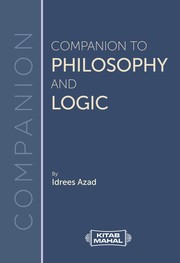Buy this book

How do we know that Earth is round? We don't observe the roundness of Earth directly. We see, it is flat. We walk on it, on straight roads but we still believe it is round. Not long ago, people of planet Earth were not capable of accepting as true that Earth is a planet and it is almost round like a globe. They had a belief that earth is flat. At that time this question of roundness and flatness of Earth was a problem of Philosophy because it was a common belief accepted by everyone without questioning. Philosophy questions common beliefs. In fact only a few minds make efforts to inquire such widely accepted beliefs. They are called Philosophers. Anyhow, as soon as the problem was solved, it became the subject of a separate discipline and the roundness or flatness of Earth was no more a problem of philosophy. From this example we learn that philosophy deals only with unanswered or unsolved questions and problems always, and most of them are usually commonly accepted beliefs.
Have we ever took a moment to think about PHD? Every discipline of academic knowledge becomes philosophy at its higher level? As we know that the abbreviation PHD stands for the term "doctor of philosophy". It means no matter which discipline it is, but it is still philosophy. It might be mathematics, chemistry, literature or any other academic discipline but when someone is seeking answers for some specific questions or trying to solve some problems, he is academically called a research scholar. That is why, a research scholar is always a student of philosophy.
Informally every human is a philosopher if he is in search of some answers but formally only those great wise men are known as philosophers who have contributed to the mainstream knowledge of the world about the world. In fact it is curiosity that makes you ponder on something new. Philosophy is indeed a discipline for curious people. Mostly philosophy deals with general but still unsolved questions, like what is this universe? Why we are here? What is our relation with it? Why even I am thinking about it? How does my mind work? Is this world real? Am I just dreaming? What happens when we die? What is reality? What is the structure of universe? Does God exist etc?
The problem with this type of thinking is that when you get deeper and deeper you get more and more involved but knowledge never ends. We should know that the enormously great building of today's human knowledge is the result of a very long series of the questions of philosophy over centuries. In order to précis the definition of philosophy we should consult some reliable encyclopedia. Encyclopedia of Britannica defines philosophy as,
"Philosophy, (from Greek, by way of Latin, philosophia, “love of wisdom”) the critical examination of the grounds for fundamental beliefs and an analysis of the basic concepts employed in the expression of such beliefs. Philosophical inquiry is a central element in the intellectual history of many historical civilizations".
So our goal through this course is to introduce philosophy as a discipline of knowledge. We shall study history of philosophy, branches of philosophy, basic concepts, terms and known problems of philosophy and of course basic principles of Logic.
Buy this book

Showing 1 featured edition. View all 1 editions?
| Edition | Availability |
|---|---|
|
1
Companion To Philosophy And Logic
January 2017, Kitab Mahal, Darbar Market, Lahore
Hardcover
in English
|
aaaa
|
Book Details
Table of Contents
Edition Notes
Contributors
The Physical Object
ID Numbers
Community Reviews (0)
Feedback?History
- Created January 15, 2017
- 7 revisions
Wikipedia citation
×CloseCopy and paste this code into your Wikipedia page. Need help?
| January 17, 2017 | Edited by Libra | editing about text |
| January 17, 2017 | Edited by Libra | changing about text and table of contents |
| January 15, 2017 | Edited by Libra | Added a New Book of Author Idris Azad |
| January 15, 2017 | Edited by Libra | Added new cover |
| January 15, 2017 | Created by Libra | Added new book. |











